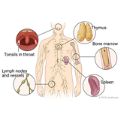Antinuclear Antibodies (ANA)
Test Overview
An antinuclear antibody (ANA) test measures the amount and pattern of antibodies in your blood that work against your own body (autoimmune reaction).
The body’s immune system normally attacks and destroys foreign substances such as bacteria and viruses. But in disorders known as autoimmune diseases, the immune system attacks and destroys the body’s normal tissues. When a person has an autoimmune disease, the immune system produces antibodies that attach to the body’s own cells as though they were foreign substances, often causing them to be damaged or destroyed. Rheumatoid arthritis and systemic lupus erythematosus are examples of autoimmune diseases.
An ANA test is used along with your symptoms, physical examination, and other tests to find an autoimmune disease.
Why It Is Done
An antinuclear antibodies (ANA) test is done to help identify problems with the immune system, such as:
- Rheumatoid arthritis.
- Systemic lupus erythematosus (SLE).
- Polymyositis.
- Scleroderma.
- Sjögren’s syndrome.
How To Prepare
You do not need to do anything before you have this test.
Talk to your doctor about any concerns you have regarding the need for the test, its risks, how it will be done, or what the results will mean. To help you understand the importance of this test, fill out the medical test information form( What is a PDF document? ).
How It Is Done
The health professional drawing blood will:
- Wrap an elastic band around your upper arm to stop the flow of blood. This makes the veins below the band larger so it is easier to put a needle into the vein.
- Clean the needle site with alcohol.
- Put the needle into the vein. More than one needle stick may be needed.
- Attach a tube to the needle to fill it with blood.
- Remove the band from your arm when enough blood is collected.
- Apply a gauze pad or cotton ball over the needle site as the needle is removed.
- Apply pressure to the site and then a bandage.
How It Feels
The blood sample is taken from a vein in your arm. An elastic band is wrapped around your upper arm. It may feel tight. You may feel nothing at all from the needle, or you may feel a quick sting or pinch.
Risks
Blood test
There is very little chance of a problem from having a blood sample taken from a vein.
- You may get a small bruise at the site. You can lower the chance of bruising by keeping pressure on the site for several minutes.
- In rare cases, the vein may become swollen after the blood sample is taken. This problem is called phlebitis. A warm compress can be used several times a day to treat this.
Results
An antinuclear antibody (ANA) test measures the amount and pattern of antibodies in your blood that work against your own body (autoimmune reaction). If there are more antibodies in the blood than normal, the test is positive. When the test is positive, most labs do other tests right away to look for the cause. These tests can find out which antibodies are in the blood in higher amounts than normal.
Sometimes ANA test results can be abnormal even when a person is healthy.
Positive test
A positive ANA test may be caused by:
- Autoimmune connective tissue diseases. Examples include:
- Rheumatoid arthritis. More than one-third of people with rheumatoid arthritis have a positive ANA test.
- Systemic lupus erythematosus (SLE). Almost all people with SLE have a positive ANA test. But most people with a positive ANA test do not have SLE.
- Scleroderma.
- Sjögren’s syndrome.
- Juvenile idiopathic arthritis.
- Polymyositis.
- Raynaud’s syndrome.
- Autoimmune diseases of other organs. Examples include:
- Addison’s disease.
- Diseases of the blood cells, such as vitamin B12 deficiency, immune thrombocytopenia (ITP), and hemolytic anemia.
- Liver disease, such as hepatitis.
- Thyroid disease, such as Hashimoto’s thyroiditis.
- Medicines, such as those used to treat high blood pressure, heart disease, and tuberculosis (TB).
- Viral infections.
What Affects the Test
Reasons you may not be able to have the test or why the results may not be helpful include:
- Taking medicine. Many medicines can change the results of this test. Be sure to tell your doctor about all the nonprescription and prescription medicines you take.
- A virus. Viral illness can cause an ANA to be positive, and later turn back to normal.
What To Think About
- Autoimmune diseases can’t be diagnosed by the results of the ANA test alone. A complete medical history, physical examination, and the results of other tests are used with the ANA test to help identify autoimmune diseases, such as systemic lupus erythematosus (SLE) or rheumatoid arthritis.
- Some healthy people can have an increased amount of ANA in their blood. For instance, this can happen in some people with a family history of autoimmune disease. The higher the ANA level is, though, the more likely it is that the person has an autoimmune disease.
- ANA levels can increase as a person ages.
Current as of: April 1, 2019
Author: Healthwise Staff
Medical Review:Anne C. Poinier MD – Internal Medicine & Martin J. Gabica MD – Family Medicine & E. Gregory Thompson MD – Internal Medicine & Kathleen Romito MD – Family Medicine & Adam Husney MD – Family Medicine
This information does not replace the advice of a doctor. Healthwise, Incorporated, disclaims any warranty or liability for your use of this information. Your use of this information means that you agree to the Terms of Use. Learn how we develop our content.


